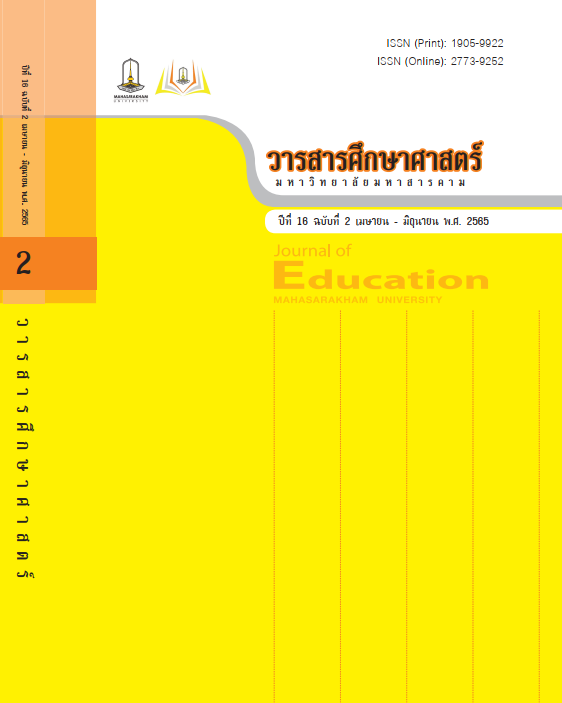Research Based Learning Management to Promote ProblemSolving and Achievement Capabilities in Early Childhood Education Innovation Course
Main Article Content
Abstract
The objectives of this research aimed to 1) develop a learning management plan using research based learning management in early childhood education innovation courses set in accordance with the criteria at 80/80, 2) compare the problem-solving ability before and after using research based learning management, and 3) compare the achievement capabilities before and after using research based learning management in early childhood education innovation courses. The sample used in this research consisted 25 students of the Faculty of Education in the field of early childhood education, studying in the 3rd year, Udon Thani Rajabhat University. The research instruments included the research based learning management in early childhood education innovation courses has suitability value was 4.50, and the test of problem-solving ability with reliability of 0.90 and achievement test in early childhood education innovation courses for testing before and after learning with reliability of 0.85. The statistics used for data analysis included percentage, mean, standard deviation, and one sample t-test.
The research findings indicated that:
1) the efficiency of learning management plans was at 82.39/80.29, which showed that the learning management plans had higher efficiency than the criterion.
2) the students had higher score of problem-solving ability in post-study than prestudy at the significant level of.01.
3) the students had higher academic achievement score in post-study than pre-study at the significant level of.01.
Downloads
Article Details

This work is licensed under a Creative Commons Attribution-NonCommercial-NoDerivatives 4.0 International License.
References
กีรตาพันธุ์ ฝาชัยภูมิ. (2554). การเปรียบเทียบผลสัมฤทธิ์ทางการเรียน เรื่อง อาหารและโภชนาการการคิดวิเคราะห์ และความคิดสร้างสรรค์ของนักเรียนชั้นประถมศึกษาปีที่ 5 ที่เรียนด้วยการจัดการเรียนรู้โดยใช้วิจัยเป็นฐานและการจัดการเรียนรู้แบบปกติ. วิทยานิพนธ์ปริญญามหาบัณฑิต สาขาวิชาหลักสูตรและการสอนมหาวิทยาลัยมหาสารคาม.
กระทรวงศึกษาธิการ. (2562). ประกาศกระทรวงศึกษาธิการ เรื่อง มาตรฐานคุณวุฒิระดับปริญญาตรี สาขาครุศาสตร์และสาขาศึกษาศาสตร์ (หลักสูตรสี่ปี) พ.ศ. 2562. (2562, 6 มีนาคม). ราชกิจจานุเบกษา. เล่ม 136 ตอนพิเศษ 56 ง.
จุฑา ธรรมชาติ. (2552). การวิจัยและพัฒนารูปแบบการจัดการเรียนรู้แบบใช้วิจัยเป็นฐานใน รายวิชาการวิจัยทางการศึกษา. คณะศึกษาศาสตร์ มหาวิทยาลัยสงขลานครินทร์ วิทยาเขตปัตตานี: ปัตตานี.
จุฑา ธรรมชาติ. (2555). การวิจัยและพัฒนาการจัดการเรียนรู้แบบใช้วิจัยเป็นฐานในรายวิชาการวิจัยทางการศึกษา. วารสารสงขลานครินทร์ ฉบับสังคมศาสตร์และมนุษยศาสตร์, 18(1): 183-214.
ทิพย์วิมล วังแก้วหิรัญ. (2562). รูปแบบการเรียนการสอนด้วยยุทธศาสตร์สะท้อนอภิปัญญาร่วมกับการเรียนรู้โดยใช้การวิจัยเป็นฐาน: นวัตกรรมการจัดการเรียนรู้เพื่อพัฒนาทักษะแห่งศตวรรษที่ 21. วารสารศึกษาศาสตร์ มหาวิทยาลัยทักษิณ, 19(2): 1-16.
บุญชม ศรีสะอาด. (2535). การวิจัยเบื้องต้น. พิมพ์ครั้งที่ 3. กรุงเทพฯ: สุวีริยาสาส์น.
ประพันธ์ศิริ สุเสารัจ. (2551). การพัฒนาการคิด. กรุงเทพฯ: 9119 เทคนิคพริ้นติ้ง.
ไพฑูรย์ สินลารัตน์. (2547). หลักการสอนแบบเน้นการวิจัย (Research-Based Teaching) ในระดับ
อุดมศึกษา ในการเรียนการสอนที่มีการวิจัยเป็นฐาน. กรุงเทพฯ: คณะครุศาสตร์ จุฬาลงกรณ์มหาวิทยาลัย.
ราชกิจจานุเบกษา. (2562). ยุทธศาสตร์ชาติ (พ.ศ. 2561-2580). เล่ม 135 ตอนที่ 38 ก 13 ตุลาคม 2561.
วิทวัส เพ็ญภู่, เสรี ชัดแช้ม, และพุฒิชาดา จันทะคุณ. (2563). การแก้ปัญหาที่ซับซ้อน: ทักษะที่สำคัญอันดับแรกของศักยภาพมนุษย์ในศตวรรษที่ 21. วารสารครุศาสตร์สาร: Journal of Educational Studies, 14(1), 253-267.
วิสาลักษณ์ สิทธิ์ขุนทด. (2555). การศึกษาการจัดการเรียนรู้แบบใช้วิจัยเป็นฐานในรายวิชา BUS304 ระเบียบวิธีวิจัยทางธุรกิจ. รายงานวิจัยเพื่อพัฒนาการเรียนการสอน ศูนย์สนับสนุนและพัฒนาการเรียนการสอน มหาวิทยาลัยศรีปทุม.
ศศิธร นาคดิลก. (2549). การเปรียบเทียบผลสัมฤทธิ์ทางการเรียนและพฤติกรรมการคิดแก้ปัญหาวิชาคณิตศาสตร์โดยใช้และไม่ใช้การแก้ปัญหาปลายเปิดของนักเรียนชั้นมัธยมศึกษา ปีที่ 2. วิทยานิพนธ์หลักสูตรปริญญาครุศาสตรมหาบัณฑิต สาขาวิชาหลักสูตรและการสอนมหาวิทยาลัยราชภัฏอุดรธานี.
เสาวภา วิชาดี. (2554). การศึกษาในกระบวนทัศน์ใหม่: การเรียนโดยใช้การวิจัยเป็นฐาน. วารสารนักบริหาร, 31(3): 26-30.
Astbury, K. (2006). Fresh Theatre of the first empire: Enhancing research-based learning. Warwick Interactions Journal, 28.
Healey, M. (2005). Linking research and teaching to benefit student learning. Journal of Geography in Higher Education, 29(2): 183-201.


